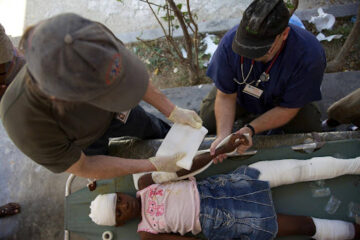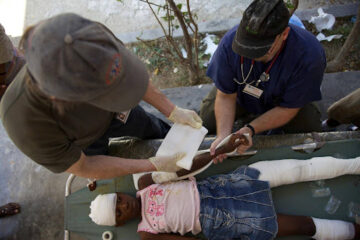BACKGROUND
On January 12, 2010, a 7.0 magnitude earthquake struck Haiti, the poorest country in the Western hemisphere. Just 25 kilometers west of Port au Prince, and 13 km in depth the catastrophic event killed than 230,000 people and injured more than 300,000. An impoverished nation where nearly 70% of the population lives on less than $2 a day, the earthquake affected 2.8 million people and displaced 1.5 million. The devastating event immediately overwhelmed the fractured healthcare system by not only the devastating toll to the facilities, but also by the sheer magnitude of medical need.
THE RESPONSE
Within four days of the event, an NYCM assessment team was on the ground working with the Haitian Ministry of Health (MOH), United Nations Office for the Coordination of Humanitarian Affair (OCHA) and the World health Organization (WHO), and other local and international organizations paving way for the first mobile medical team. A team of ten seasoned, emergency care clinicians arrived two days later transporting two tons of donated essential medicines and medical supplies across the border from the Dominican Republic.
In less than 12 hours of their arrival, the first medical camp was erected in a schoolyard in one of the worst affected ares of Port au Prince, Cite Militaire. In the first three days NYCM volunteers treated over one thousand patients seeing everything from severe crush injuries, fractures, and abrasions to anxiety, diabetes and other chronic illnesses. As the urgent needs in this community diminished, NYCM mobile teams worked in makeshift displacement camps throughout Port au Prince, treating all and transporting the worst medical cases. The team ended its stay by staffing the night shift at Hôpital de l’Université d’État d’Haïti (State University of Haiti Hospital), the main national referral hospital in Port au Prince. Three additional medial teams, all of whom worked endlessly to ease the suffering of the survivors of the quake, worked throughout Port au Prince as well as beyond the city borders in regions that had not received any form of medical care until NYCM arrived.
In addition to our fieldwork, NYCM provided logistical support to several other aid organizations, including the Harvard Health Initiative for whom we managed international transportation and logistics for 10 medical teams from the US to Haiti.
IMPACT
The NYCMedics Disaster Medical Teams achieved the following:
- Diagnosed and treated more than 12,000 patients; on average cared for 350 patients a day
- Directed four teams (53 volunteer medical professionals) in disaster relief efforts throughout severely affected and remote communities
- Assessed and served over 20 communities in need
- Provided emergency medical evacuations and secured appropriate care for ## critical patients
- Managed the operations, logistics and volunteer transportation coordination of nearly 100 medical personnel that supported local and international nonprofits throughout the country
PARTNERS
- JetBlue
- The Jenkins-‐Penn Haiti Relief Organization (J/P HRO)
- Hopital de L’Universite d’Haiti
- Harvard Health Initiative

